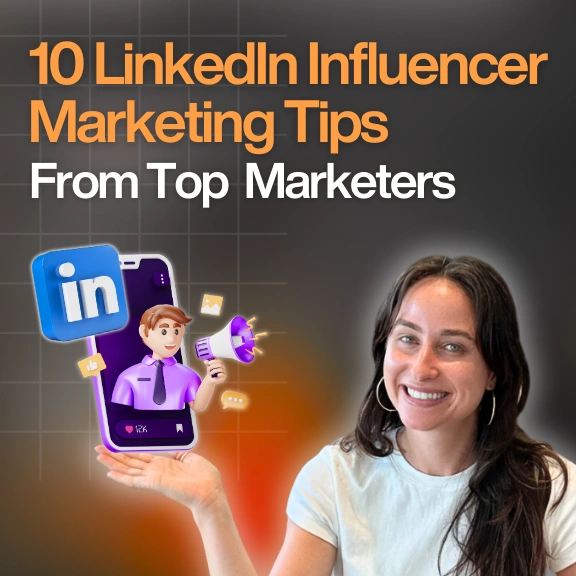Blog & Articles
Your ultimate ressource for the creator economy
Methodology & Rankings
About Favikon, rankings, tools & much more.
Insights
The recipe behind Favikon's viral & coveted rankings.
Free tools to power your influencer marketing workflows.
See Favikon users' success stories.
Get access to all Favikon rankings.
Become a Partner
Become an Affiliate
About the team behind Favikon
The place to talk creator economy, together


Featured Rankings

Here is the Top 50 Rising Video Creators on LinkedIn. Video is quickly becoming the platform’s most powerful format, with creators gaining more reach and engagement than ever. As Gen Z grows its presence and tools like BrandLink and Thought Leader Ads support content creation, LinkedIn is doubling down on video. This ranking, made in partnership with OpusClip, celebrates the creators leading this shift and aims to inspire anyone ready to start sharing through video.

Here is the Top 50 Rising Video Creators on LinkedIn. Video is quickly becoming the platform’s most powerful format, with creators gaining more reach and engagement than ever. As Gen Z grows its presence and tools like BrandLink and Thought Leader Ads support content creation, LinkedIn is doubling down on video. This ranking, made in partnership with OpusClip, celebrates the creators leading this shift and aims to inspire anyone ready to start sharing through video.
Who is Philipp Baaske?
Philipp Baaske speaks biotech in human terms. He pairs deep technical knowledge with founder instincts and a knack for public storytelling.
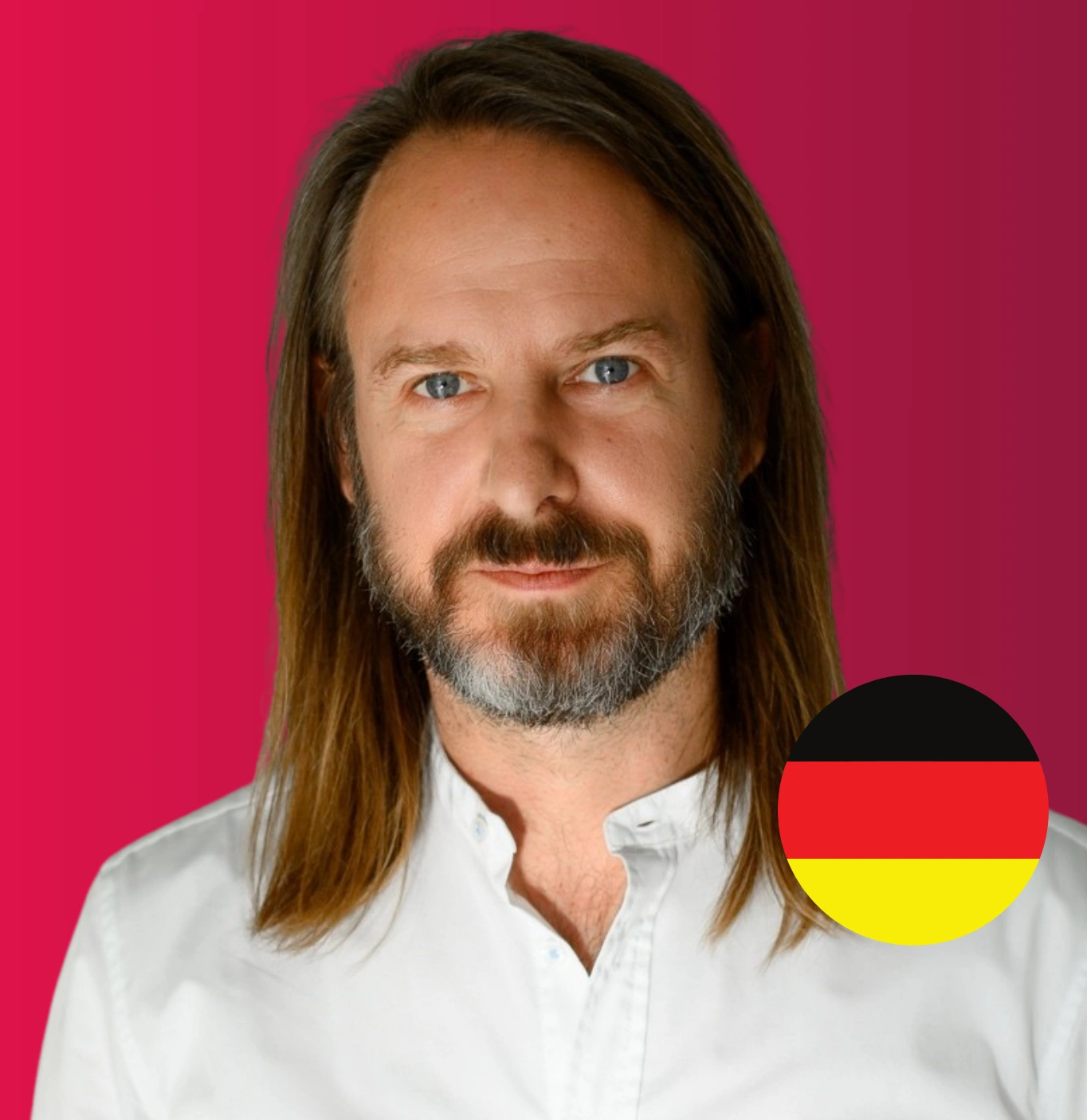
.png)

Elena Freeman designs partnerships and events at Favikon. She cares about building spaces where creators, brands, and ideas meet in ways that feel real and memorable. From partner programs to community gatherings, she focuses on making connections that spark collaboration and professional growth.
Check Brand Deals
Philipp Baaske: Biotech builder who blends science, startups, and public purpose
Philipp Baaske speaks biotech in human terms. He pairs deep technical knowledge with founder instincts and a knack for public storytelling. People follow him for candid lessons on startups, science, and leadership. His voice is direct, reflective, and quietly optimistic.
1. Who he is
Philipp Baaske is an experienced biotech entrepreneur and leader with 19 plus years building companies like NanoTemper. He combines biophysics expertise with hands on startup building and executive leadership. He has moved from founder roles into university and ecosystem leadership at LMU, where he focuses on entrepreneurship and technology transfer. His posts mix technical detail, personal anecdotes, and practical strategy for scaling science driven ventures. He often reflects on leadership lessons, governance choices, and the trade offs of building teams. That combination makes him a useful bridge between bench science and boardroom decisions.
2. A Network of Heavyweights
Philipp’s network spans academia, venture builders, and innovation hubs in Munich and beyond. He is connected with LMU, Munich Quantum Valley, technology transfer offices, and startup accelerators. He engages with fellow founders, investors, and technical experts in biotech and STEM. Those ties give him access to research, funding conversations, and policy discussions that matter for deep tech ventures.
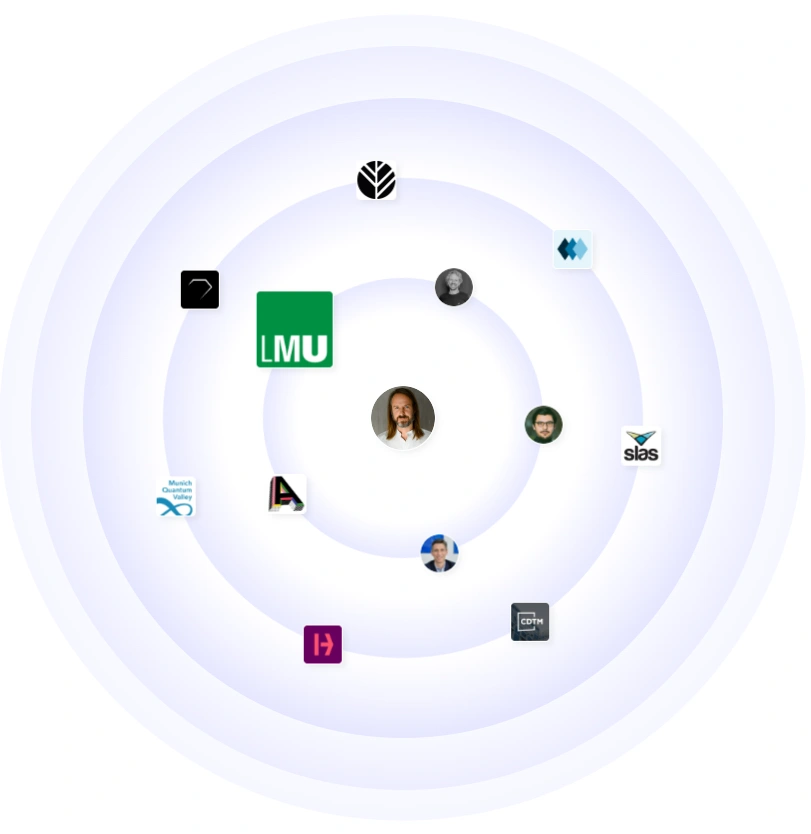
3. Why people listen
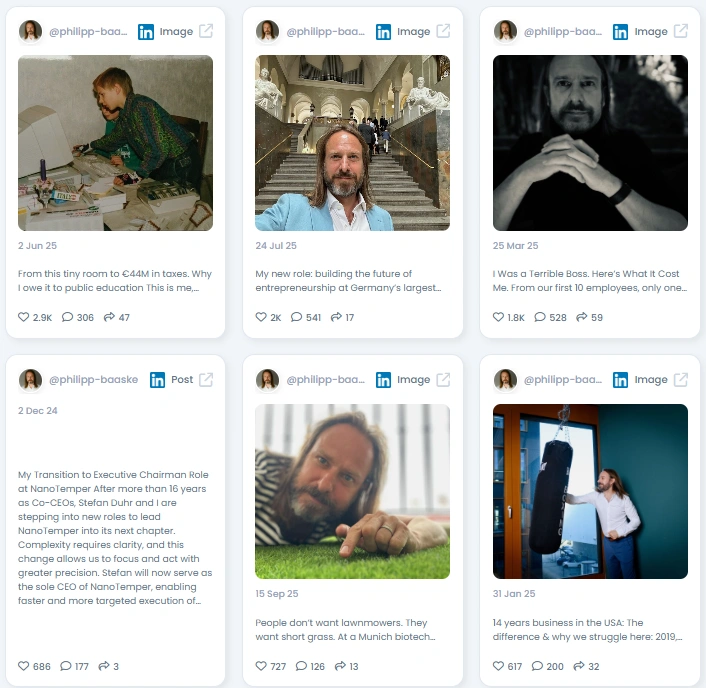
He explains complex science without losing rigour. He shares tactical stories from his years running companies. He points out real decisions, not platitudes, which helps leaders and founders learn faster. His posts balance optimism with hard earned realism, and that honesty keeps people coming back.
4. Authenticity that resonates
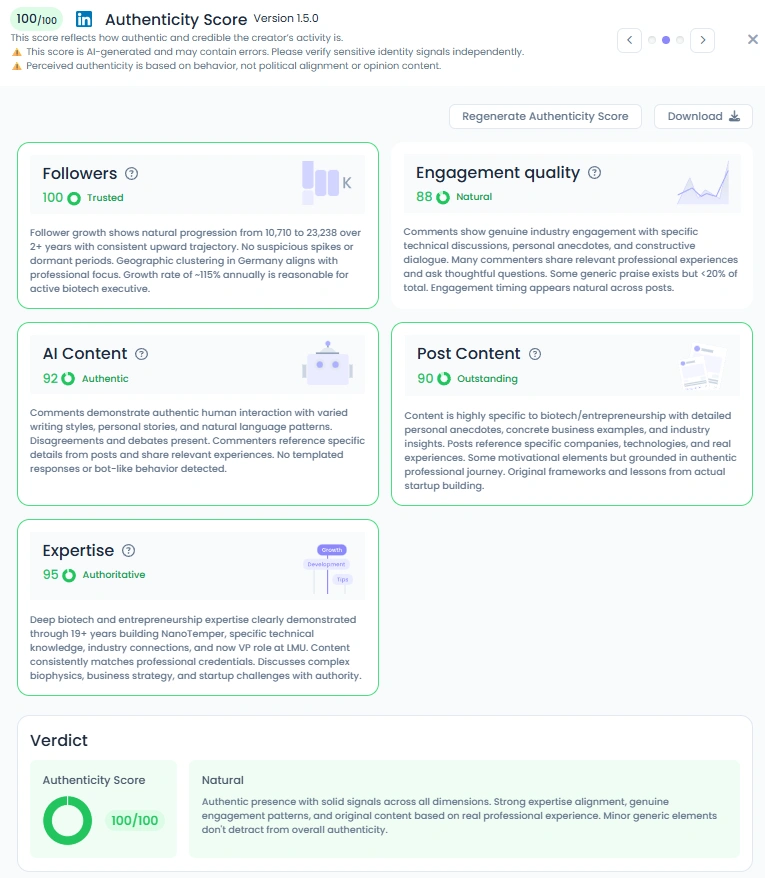
Philipp scores a perfect 100 for authenticity. His content reads like a real person sharing real experience. He posts candid photos, personal transitions, and long form reflections that spark thoughtful comments. Engagement patterns show professional dialogue, peer questions, and constructive pushback. That mix of vulnerability and expertise creates trust.
5. Numbers that back it up

Follower growth shows steady progression from about 10,710 to 23,238 across two plus years. His influence score is strong at 6,757 points, reflecting a significant professional audience. Engagement is healthy with deep comments and industry specific discussion. He ranks in the top 1 percent on LinkedIn Germany and high in biology and STEM categories globally.
6. Collaborations that matter
Philipp partners with universities, research initiatives, and entrepreneurship programs to translate science into impact. He works with LMU and regional innovation networks to support spinouts and student founders. He has a track record of working with investors and technical partners to scale laboratory innovations into commercial products.
7. Why brands should partner with Philipp Baaske
He is a fit for brands that want credible, science grounded storytelling and ecosystem reach.
- Thought leadership pieces on translating research into products.
- Executive panels or keynote talks on biotech entrepreneurship and governance.
- Co-created educational content for founders and researchers.
- Advisory collaborations on technology transfer, scouting, or validation programs.
8. What causes he defends

Philipp champions diversity and inclusion at work, broad access to education, and a pro Europe outlook. He highlights the role of inclusive teams in solving hard scientific problems and the need to widen access to technical education. He supports efforts that lower barriers for student founders and that improve pathways from university research to startups. His writing often connects policy, education, and institutional reform to practical outcomes for innovation.
9. Why Philipp Baaske is relevant in 2026
In a year where biotech faces scrutiny and opportunity, Philipp’s blend of technical credibility and ecosystem leadership will be essential. He can translate scientific advances into clear business cases and public narratives. As AI and automation reshape lab work, his experience guiding teams and scaling companies will help founders adapt. Brands and institutions will keep seeking voices that can speak to both science and society.
Conclusion: Guiding Science Toward Impact
Philipp Baaske brings steady experience to the messy work of turning discovery into value. He combines technical depth, founder wisdom, and ecosystem influence in a practical package. For anyone navigating biotech, entrepreneurship, or university commercialization, his perspective shortens the learning curve. His long term value will be measured by the teams he helps build and the ideas that reach the market.
Related Articles
See all the articlesResources











.png)
